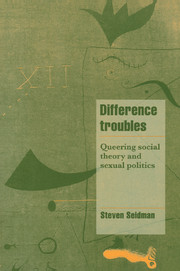Book contents
- Frontmatter
- Contents
- Preface
- Acknowledgements
- Introduction: the contemporary reconfiguring of social theory
- Part I Resisting difference: the malaise of the human sciences
- 1 The political unconscious of the human sciences
- 2 The end of sociological theory
- 3 Relativizing sociology: the challenge of cultural studies
- 4 The refusal of sexual difference: queering sociology
- 5 Difference troubles: the flight of sociology from “otherness”
- Part II Engaging difference: from lesbian and gay studies to queer theory
- Part III Democratic prospects: the politics of knowledge and identity
- Epilogue: pragmatism, difference and a culture of strong democracy
- Notes
- References
- Index
4 - The refusal of sexual difference: queering sociology
from Part I - Resisting difference: the malaise of the human sciences
Published online by Cambridge University Press: 05 October 2010
- Frontmatter
- Contents
- Preface
- Acknowledgements
- Introduction: the contemporary reconfiguring of social theory
- Part I Resisting difference: the malaise of the human sciences
- 1 The political unconscious of the human sciences
- 2 The end of sociological theory
- 3 Relativizing sociology: the challenge of cultural studies
- 4 The refusal of sexual difference: queering sociology
- 5 Difference troubles: the flight of sociology from “otherness”
- Part II Engaging difference: from lesbian and gay studies to queer theory
- Part III Democratic prospects: the politics of knowledge and identity
- Epilogue: pragmatism, difference and a culture of strong democracy
- Notes
- References
- Index
Summary
If we follow the recent history and theory of sexuality, we are asked to assume that sexuality is a social fact. What is imagined as sexuality, its personal and social meaning and form, varies historically and between social groups. Indeed, if we are to take seriously Foucault's The History of Sexuality (1980), the very idea of sexuality as a unity composed of discrete desires, acts, developmental patterns, and sexual and psychological types, is itself a recent and uniquely “modern” Western event. For example, the ancient Greeks imagined a sphere of pleasures (aphrodisia) which included eating, athletics, man/boy love, and marriage, not a realm of sexuality (Foucault 1985). This new theorizing figures sex as thoroughly social: bodies, sensations, pleasures, acts, and interactions are made into “sex” or accrue sexual meanings by individuals, groups, discourses, and institutional practices. Framing “sex” as social unavoidably makes it a political fact. Which sensations or acts are denned as sexual and what moral boundaries demarcate legitimate and illegitimate sex and who stipulates this is political. Paralleling class or gender politics, sexual politics involves struggles around the formation of, and resistance to, a sexual social hierarchy (Rubin 1982).
The current theorization of sex as a social and political fact prompts a rereading of the history of modern societies and social knowledges. In this chapter, I offer a sketch of a critical reinterpretation of classical and current sociology from the vantage point of recent Western queer studies.
- Type
- Chapter
- Information
- Difference TroublesQueering Social Theory and Sexual Politics, pp. 81 - 96Publisher: Cambridge University PressPrint publication year: 1997

